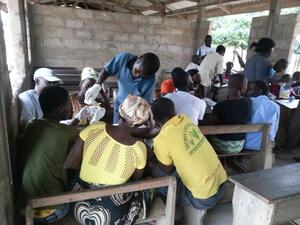Ghana
People in Ghana, like in many other countries in sub-Saharan Africa, are prone to several forms of water, sanitation and hygiene (WASH) related diseases. For instance, a cholera outbreak which started in June 2014 claimed about 243 lives nationwide as at January 2015, with total reported cases of 28,922. Several factors accounted for the cholera epidemic including poor waste disposal, inadequate drinking water, inadequate personal hygiene and poor sanitation. Preliminary results from on-field water sample analysis conducted in the Greater Accra region of Ghana in 2014, revealed that 48.5 percent of households’ drinking water could be classified as unsafe or very high risk for human consumption (i.e. E. coli MPN >100). Only 16 percent of the households in the study area have safe drinking water (i.e. E. coli MPN=0). The water quality for general purpose is even worse, with 70 percent of the households in the study area using unsafe or very high risk water.
The main focus of the Ghana component is an experimental study involving school children and adult household members on how self-water quality testing and information could improve household WASH behavior and water quality. The study also looked at the potential benefits in terms of health outcomes as measured in diarrhea rates reduction and impact on children health and nutrition (through anthropometric measurements). The project performed key activities such as encouraging households to get involved in water quality testing and using the information in managing household water, providing training on water quality testing including water sample collection, delivery of portable water testing toolkits (Acquagenx’s Compartment Bag Test (CBT)) and water testing results diary/score sheets.
Partners: Institute of Statistical, Social and Economic Research (ISSER), University of Ghana, Legon
Contact person: Charles Yaw Okyere




